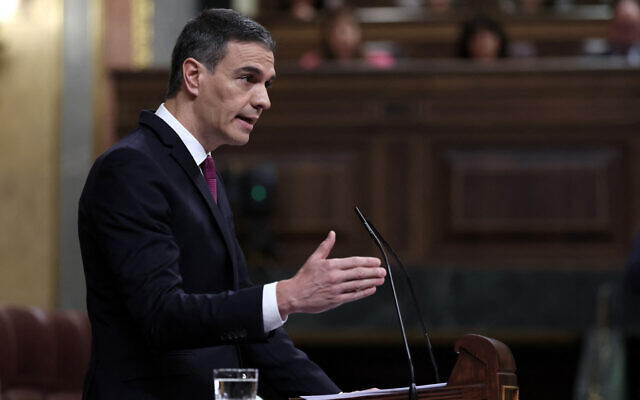Can Spain Spearhead the recognition of a Palestinian state?
Position paper: Progress Centre for Policies
The Prime Minister of Spain is preparing to launch a campaign with the European Union countries to support the issue of recognition of the Palestinian state. The issue raises tension and debate among the governments of Western countries. This issue witnessed remarkable transformations in major Western capitals, from Washington to London, through Paris and Canberra. It was noteworthy that Australia joined the group of countries that expressed their willingness to recognize the Palestinian state. What are the available and potential possibilities for this path?
To understand the context, it is necessary to observe the winding path of the positions of the countries concerned:
– On April 10, Spanish Prime Minister Pedro Sánchez saw recognition of a Palestinian state as “a geopolitical interest for Europe.” Madrid announced that it will meet with a number of its counterparts in the European Union during the coming week to attempt to rally support behind the recognition of a Palestinian state.
– On April 2, Sánchez announced his country’s intention to recognize the Palestinian state by July, indicating movement within the European Union encouraging member states to take the same position. Last November, he indicated the possibility of unilateral recognition of the Palestinian state if the European Union did not do so.
– Last month, the leaders of Spain, Ireland, Slovakia and Malta expressed their willingness to recognize a Palestinian state in a joint statement.
– On April 10, Irish Foreign Minister Micheál Martin announced that his country intends to move to recognize a Palestinian state in the coming weeks, and that he would submit a formal proposal to the government regarding this, stressing that the “recognition of a Palestinian state will happen and that postponing recognition” is no longer convincing or defensible.”
– On April 9, Australian Foreign Minister Penny Wong said that Canberra would consider recognizing a Palestinian state. She said that the international community sees the establishment of a Palestinian state as “a means to build momentum towards a two-state solution.” She added, “The two-state solution is the only hope for breaking the endless cycle of violence.”
– On January 30, British Foreign Secretary David Cameron stated that his government was considering officially recognizing the Palestinian state. According to Cameron, this could mean an “irreversible” step towards a two-state solution in the Middle East and the establishment of a Palestinian state. On February 2, Cameron said that his country could officially recognize the Palestinian state after the ceasefire in Gaza, without waiting for the outcome of the negotiations on the two-state solution. On April 7, Cameron said that recognition of a Palestinian state, including at the United Nations, “can’t come at the start of the process, but it doesn’t have to be the very end of the process.”
– On February 2, Axios reported that US Secretary of State, Anthony Blinken, asked members of his ministry to conduct a review and present political options regarding possible recognition of the Palestinian state after the Gaza war.
– On February 16, French President Emmanuel Macron said, “Recognition of the Palestinian state is not a taboo for France.”
– On February 23, the French Ministry of Foreign Affairs confirmed its openness to recognizing a Palestinian state, “provided that this is the result of negotiations.” She added, “The Palestinian State must be a viable state. It must be based on a contiguous territory, with a Palestinian Authority that must be revitalized and play a central role.”
– Germany and several European Union member states refuse to recognize the Palestinian state directly. Germany supports “building the Palestinian state within the framework of the two-state solution,” and therefore uses the term “Palestinian territories” when talking about “the occupied territories in the West Bank.”
– On November 27, the Italian Foreign Minister, Antonio Tajani, clarified that “Italy does not support recognition of Palestine without Israel’s approval. His position is consistent with what Prime Minister Giorgia Meloni has expressed previously.
Conclusion :
– Despite EU support for the two-state solution and being the largest aid donor to the Palestinians, it has not uniformly agreed as a bloc to recognize a Palestinian state. Western politicians always point to “the necessity of concluding a peace agreement with Israel as a basic condition for this.”
– European experts believe that the step that Spain wants to take may change the course of the Europeans’ dealing with the issue, if it receives the support of the largest number within the European Union. However, the levels of recognition will remain varying and subject to controversy and debate, especially in the presence of nations such as Germany which refuses to tackle such a sensitive issue, given its historical ties to Israel.
– The contexts surrounding recognition remain vague and obscure in their details, requiring Palestinian dynamics and a unified stance supported by Arab and Islamic circles as well as Southern countries.
– With the exception of the positions of Ireland and Spain, the Western position is still subject to the development of the American position on this issue, and this explains Britain’s reluctance to go further in a discussion of which London was initially at the forefront.
– Recognition of the Palestinian state has become a matter of time, not only in support of the Palestinians, but also in order to embolden Western convictions, expressed by Madrid, that this issue is of significant “geopolitical interest.”

